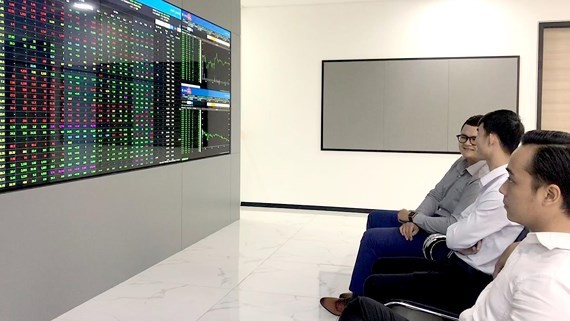
Thanks to strong recovery, the Vietnam’s stock market has been in the top two markets with highest growth globally, after China.
Liquidity has also jumped to the highest level in eight weeks partly because foreign investors fostered disbursement into construction, construction materials, banking and foods stocks. One of the factors that backed the recovery of Vietnam’s stock market was net buying of foreign investors which helped to boost investors’ sentiment on the market and created support for the market to escape the earlier four-straight-month correction. Especially, the VN-Index fled from losing trend since its peak of 1,200 points in April 2018 to return to rising trend.
By the last trading session of February this year, on three trading floors, foreign investors had bought in 377 million shares worth more than VND15.18 trillion while sold out 370 million shares worth VND13.62 trillion. Thus, total net buying volume reached 7.1 million shares in February worth more than VND1.56 trillion.
Market analysts said that massive cash flow has been activated as more investors have started to show interest in the market after neglecting for a long time. As the economy is stable and market value is more attractive than that of other countries in the region, the capital flow that stands outside the market or was spread to other investment channels, such as savings, bullion and foreign currency will return to the stock market when the opportunities become more obvious. Macroeconomic outlook as well as the healthiness of listed companies remains the reason that has motivated stronger disbursement from both local and foreign investors.
As for market trend, experts said that the hardest period of the market was over. The market rebounded from the bottom with forward price to earning ratio of 13-14 times which is an attractive level for medium and long term capital flow when business base of firms is positive. Moreover, this year, the market will see more divestments at large state-owned enterprises such as VGC and ACV. This will help the cash flow to continue to join the market in the near future. In addition, the Vietnam’s stock market is likely to welcome new capital flow from both local and foreign investors thanks to the chance to promote the image of the country after the summit between the US and North Korea.
Leader of the Military Bank Securities Joint Stock Company said that the global stock market will be optimistic this year as good news about the trade war between the US and China, the partial US government shutdown, change in monetary policy of the Federal Reserve will help global stock market to positively recover.
Of which, with the US Federal Reserve holding off interest rate hike, capital flow will increase again at emerging markets so there is a good chance that much capital will be attracted into the Vietnam’s stock market. Because among emerging markets, Vietnam’s stock market is seen to have more advantages thanks to good macro foundation, more opportunities coming from trade agreements, including the Comprehensive and Progressive Agreement for Trans-Pacific Partnership and the EU-Vietnam Free Trade Agreement.
Besides, the highlight of the country’s stock market is the upgrade of the market from frontier to emerging market this year. This is the most positive motivation with changes in securities policy this year. According to Mr. Tran Van Dung, chairman of the State Securities Commission (SSC), FTSE Russell and MSCI put Vietnam into the watch list for a future possible reclassification from frontier to secondary emerging market with minimum consideration time of one year. The country is expected to be upgraded by the end of this year or early next year.
In order to secure the upgrade of Vietnam’s stock market, the SSC will focus on four main missions: completing Securities Law, restructuring the stock market, establishing Vietnam Stock Exchange and implementing some new products, including government bond futures and covered warrant.
Involving to the reclassification, securities companies said that there are several exchange-traded funds investing passively based on FTSE Emerging Markets index of FTSE Russell with total market capitalization of up to US$76.4 billion. If Vietnam’s stock market is upgraded to secondary emerging market, there will be a large foreign capital flow being poured into the country’s stock market at the times ETFs restructure their investment portfolio. Market reclassification will create favorable context for foreign cash flow to pump into Vietnam’s market in long term.
Market liquidity has improved significantly. In the period prior to the lunar New Year, average trading value was below VND3 trillion per trading session. From the lunar New Year to now, average trading value has grown to above VND4 trillion per session, sometimes up to nearly VND6 trillion per session.
























